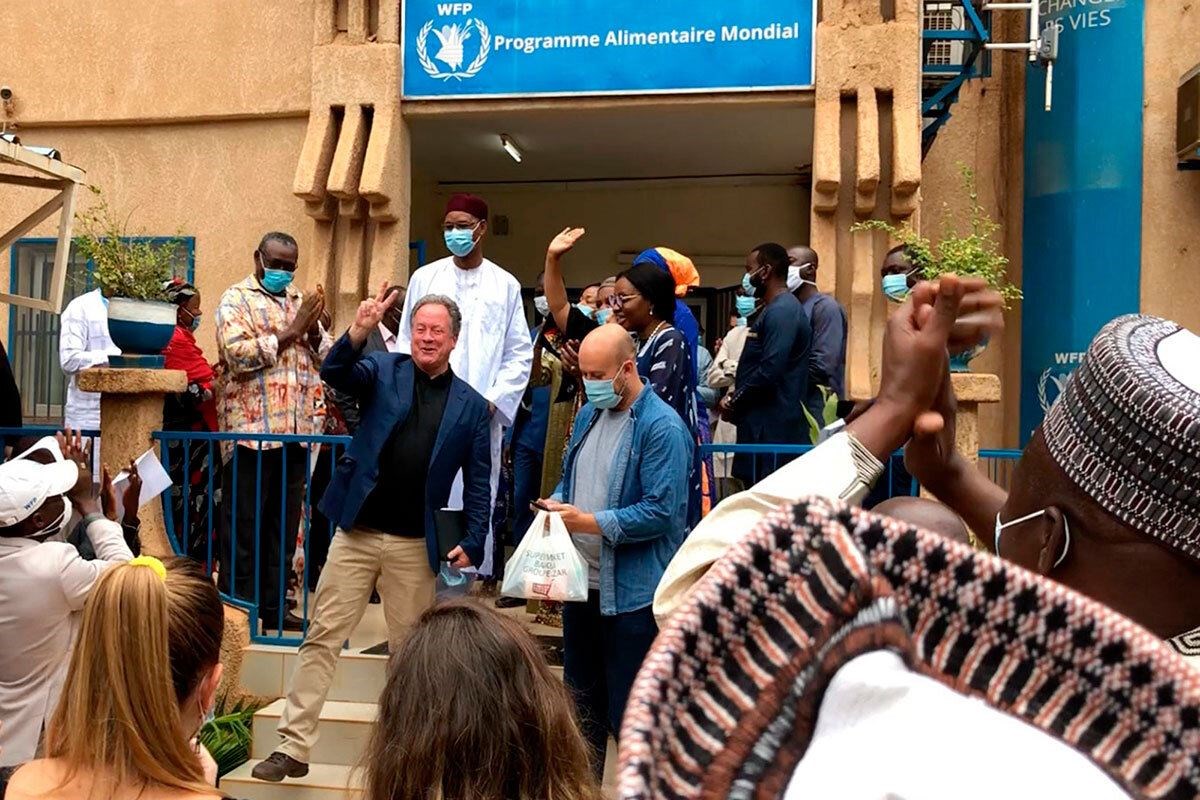REPRINTED WITH PERMISSION FROM THE CHRISTIAN SCIENCE MONITOR
 David Beasley, Executive director of the World Food Program (WFP), center, celebrates with members of WFP staff in Niamey, Niger, Oct. 9, 2020, after being awarded the 2020 Nobel Peace prize. The World Food Program has won the 2020 Nobel Peace Prize for its efforts to combat hunger and food insecurity around the globe. The announcement was made Friday in Oslo by Berit Reiss-Andersen, the chair of the Nobel Committee.WFP/AP
David Beasley, Executive director of the World Food Program (WFP), center, celebrates with members of WFP staff in Niamey, Niger, Oct. 9, 2020, after being awarded the 2020 Nobel Peace prize. The World Food Program has won the 2020 Nobel Peace Prize for its efforts to combat hunger and food insecurity around the globe. The announcement was made Friday in Oslo by Berit Reiss-Andersen, the chair of the Nobel Committee.WFP/AP
"If we don’t act now we are going to have famine of biblical proportions.”
That’s what the executive director of the World Food Program, David Beasley, told the Monitor in May. He was talking about the potential for food insecurity in developing nations due to what he called a “perfect storm” of events: a refugee humanitarian crisis, a plague of locusts in East Africa, and a pandemic sweeping through food-vulnerable nations.
The need is still great. But the World Food Program has stepped up in a time of crisis, according to the Norwegian Nobel Committee. On Friday the committee awarded this United Nations agency the Nobel Peace Prize for 2020.
“In the face of the pandemic, the World Food Program has demonstrated an impressive ability to intensify its efforts,” Berit Reiss-Anderson, the chair of the Nobel committee, said in making the announcement.
The Monitor covered the pandemic and hunger – and the WFP – a few months ago. One big problem, as Howard LaFranchi reported, was that when nations such as India go into lockdown it eliminates millions of menial and informal jobs, affecting millions of families who had been getting by. Supply chains are disrupted, impoverishing farmers and wasting precious food.
As to the peace prize, it’s easy to interpret the Nobel committee’s choice as a rebuke of a U.S. president who is dismissive of multilateralism and spoke about winning the award himself after he was nominated by a right-wing Norwegian lawmaker.
However, the U.S. has nearly doubled its funding of the WFP over the past three years, points out Mr. Beasley – himself a can-do former Republican governor of South Carolina. He rejects the view that the U.S. is withdrawing from its leadership role.
On Friday Mr. Beasley said the peace prize belongs to the WFP family.
“They’re out there in the most difficult, complex places in the world,” he said.
Page created on 9/30/2021 8:23:47 PM
Last edited 11/12/2021 5:57:50 PM
